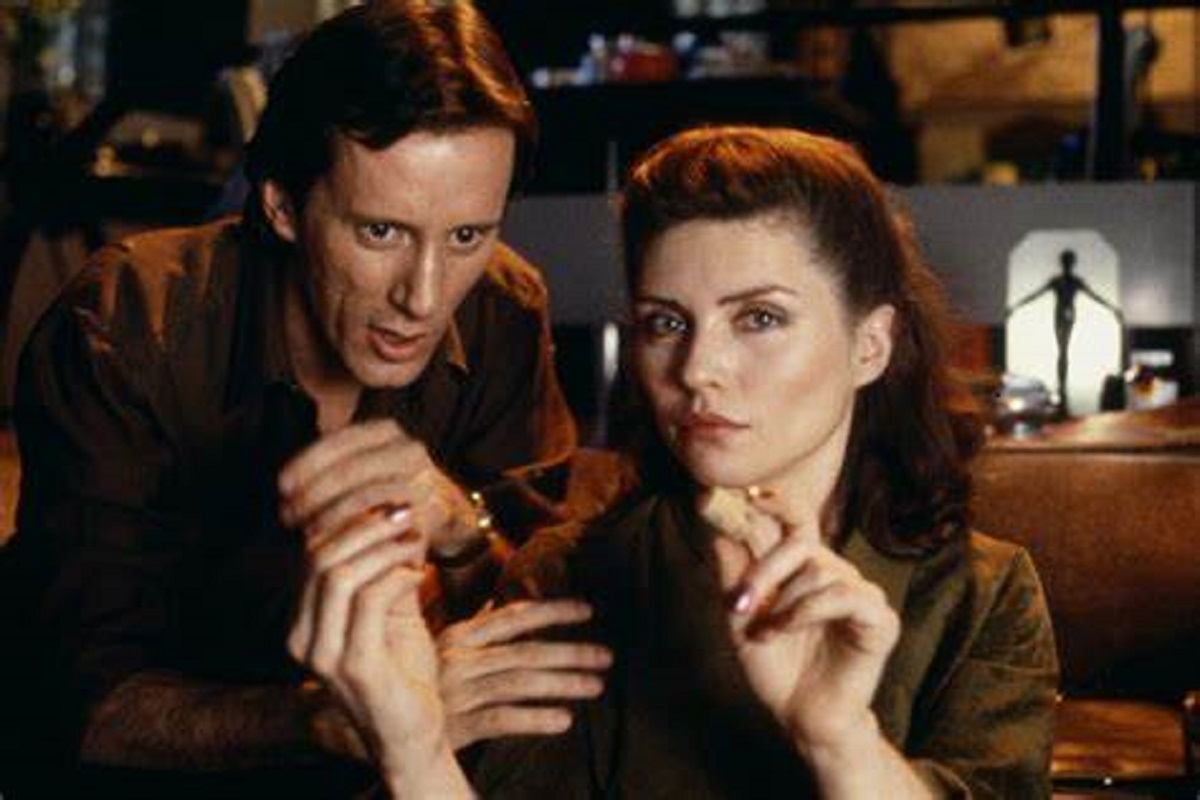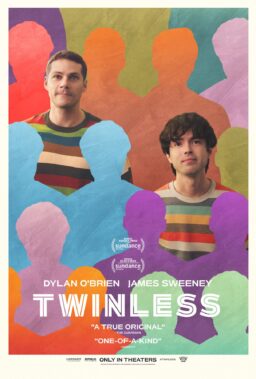After a breakthrough hit with the science fiction ultraviolence of “Scanners,” David Cronenberg’s last Canadian tax shelter film “Videodrome” dropped with a whimper in 1983, under-served by distributors unnerved by its transgressive images and genre-busting approach. Occupying a space between dystopian apocalypse and queasy body horror, it wasn’t then, and isn’t now, a film easy to categorize. How, after all, does one cut a trailer around a prophecy?
“Videodrome” is the first in a loose, unofficial trilogy that continues with “eXistenZ” (1999) and ends with last year’s “Crimes of the Future” (2022), films that tell the tale of how decades of rampant, unregulated and ill-considered technological leaps have begun to evolve, to mutate, humans at a biological level. His remake of “The Fly” (1986) literalizes that concept in a horror context, and though there are indisputable elements of the horrific in “Videodrome,” it’s ultimately better thought of as speculative fiction that, in just under 90 minutes, surgically lays bare the state of our current parasocial media landscape.
Cronenberg’s film is turning 40 this year, and New York’s Metrograph theater is presenting a new 4K restoration of the “director’s cut” of “Videodrome,” so-called for the three minutes restored to it by Cronenberg for all of its home video releases following its disappointing theatrical run. This is, in other words, the way most people have seen the film and the edit that garnered it its much-deserved cult status.
Cronenberg had it all figured out at the dawn of home video: How a la carte programming would cater to and thus embolden niche communities; how consumer-grade video products would permanently alter content; how pornography is a progressive addiction not in the sense of social progress, but in the way a cancer progresses through a body, hungrier and stranger, deadlier too, as time goes on. It understood how those on the fringe of society, outcasts and deservedly so, would find fraternity and validation for their delusions along with an outlet for a humiliation kink developed through Evangelical cultures of imagined grievance and martyrdom. And how all of it would be possible because the desire for an “unregulated” marketplace of ideas necessarily allows every manner of human ugliness to proliferate.

Videodrome is a no-frills S&M and torture show on a pirate cable channel in Cronenberg’s film, discovered by what appears to be an accident by indie program director Max Renn (James Woods), who becomes obsessed with it despite of, or perhaps because of, its lack of character, dialogue, sophisticated production value nor, indeed, plot. Always looking for a way to ramp up his illicit channel’s outré selections, Max thinks he’s found it with essentially a snuff stream targeted for boutique connoisseurs of forbidden “art.” What seemed once like an extravagant flight of fancy, this “show” that is essentially a single vile act performed for no one, is almost tame now in an age where actual murder videos pop up as suggested viewing on 24-hour social streams accessed through a device essentially fused to our palms.
“Videodrome” saw the seeds of YouTube, 24-hour cable news cycles, 4Chan, and the Dark Web in the proliferation of home video. The values of the Internet are libertarian and social diseases once thought to be on the decline are thriving again. All of the cautionary nightmares of our youth have been met and surpassed in our middle age. What Max doesn’t know is that watching Videodrome gives him an aggressive brain tumor that causes addiction to its content in exchange for tripping out his pleasure centers before causing hallucinations and even madness. Among the many brilliant things about “Videodrome” is when Max imagines impossible things, Cronenberg portrays them as “real” in the body of his work, thus aligning Max’s point of view with ours and suggesting in doing so that our brains are being damaged in the act of watching “Videodrome” in the same way Max’s is in the act of watching Videodrome. The idea that a television show could change the way we perceive the world, could blur the border between reality and sick fantasy used to be alarmist. Now it’s too late to go back and we’re in bad trouble.
Max enters into a relationship with radio host Nicki Brand (Debbie Harry), so named because she represents something greater than herself both within and without the picture. Harry is, of course, the iconic lead for no wave/CBGB post-punk pioneers Blondie and casting her in what was promoted as a low-budget Canadian exploitation flick is the epitome of, well, punk rock. She’s a brand, impossible to separate from her persona, so when it turns out Nicki is a sexual submissive with a penchant for body modification and self-mutilation, the character becomes inextricably intertwined with existing cultural fantasies about her rock star persona. She is a performance artist playing the version of herself her stalkers imagine her to be: Interested in sex with them, receptive to control, and open to flirting with skeezy, unbalanced losers like Max Renn.

Max the programmer enters into a relationship with this brand to further his channel’s reach. On their first date, Max shows Nicki his videotape of Videodrome, and in their version of “Netflix and chill,” they cap off their evening with him piercing her ears with a sewing needle and a cork. “Videodrome” is in many ways a companion piece to Marshall McLuhan’s landmark 1967 book detailing his philosophy of how technology is itself the gospel of human evolution and not the carrier of it: The Medium is the Massage. It doesn’t matter what’s in the Videodrome show; the fact of the show is itself the bellwether of the changes that have happened and the harbinger of the things to come. And it doesn’t matter what Debbie Harry says as Nicki Brand. It matters who Debbie Harry is.
As Max’s obsession with the show grows, he seeks to find its creator, only to learn that the “media prophet professor” of the “new flesh” is just a room full of videocassettes recording the thoughts of the late Dr. Brian O’Blivion (Jack Creley)—a figure Cronenberg modeled after McLuhan. The Professor Marvel of this Betamax Oz is O’Blivion’s daughter Bianca (Sonja Smits) who, periodically, edits together a new sermon for dissemination on various talk programs. She is a zealot of her dad’s mission to push the masses into the next phase of human evolution, in which images taken in through the eye manifest in the flesh. To literalize how we internalize concepts, Cronenberg has Max’s torso grow a vaginal opening into which he can insert tapes of Videodrome, hide guns that drill themselves into his hand when he wields them, and even function as a vagina dentata when penetrated without his consent. It’s easier to program a cultist than to deprogram one. The aperture is a (literally) sticky image that maintains its power to repulse and fascinate four decades on. Cronenberg’s films have always been more about ideas than effects, thus making the intimate atrocities of his effects legendarily unshakeable.

William Burroughs referred to language as a virus and Cronenberg’s adaptation of Burroughs’ “unadaptable” novel Naked Lunch is a model (as is his adaptation of J.G. Ballard’s also unadaptable Crash) of an adaptation that succeeds because of its understanding of the author’s ideas on a genetic level. The idea driving “Videodrome” is that the moment technology allowed individuals to consume only what they wanted to consume, they would become intellectually frozen and ideologically perverse. Max becomes fused with a video channel, with a gun, with paranoia and fear, the better to incite him to do violence to himself and others. “Videodrome” is a horror film, science fiction, prophecy—all of those things and also a detective story in which the more the hero learns the less he knows; a documentary now about how it is families have been Balkanized by a news-entertainment channel that fed its weakest, most terrified members a steady diet of images meant to metastasize the petty, pitiful cancers of the mind that lie dormant in all of us.
All of Cronenberg’s films are acts of anthropology. He’s interested in human behavior, in how we got here and where we’re going. “Videodrome” has lost none of its power to disturb, none of its potency as a catalyst for meaningful introspection. It is more an indictment of our predictability, our inability to escape our innate inherited behaviors, than an act of real fortune telling, but that does nothing to diminish the extent to which the picture is shockingly evergreen. It remains the rare breed of sociological provocation that might change minds. It’s a looking glass. It’s a masterpiece.












